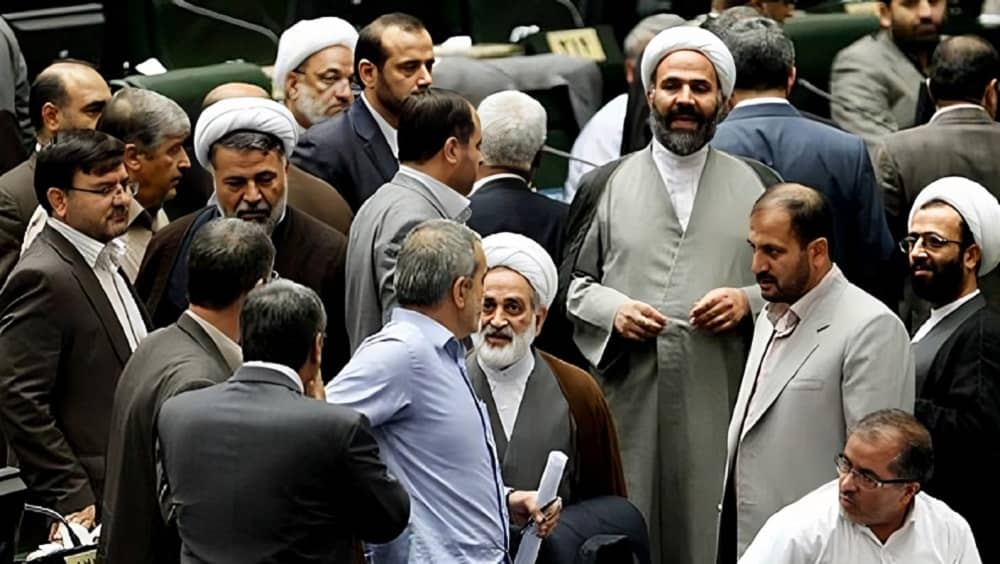Facebook
Twitter
LinkedIn
Pinterest
Reddit
Email
Print
 FILE PHOTO: turmoil inside the Iranian regime’s parliament
FILE PHOTO: turmoil inside the Iranian regime’s parliament
Two-minute read
Amidst escalating economic crises and mounting public discontent, Iranian officials have turned against one another, hurling accusations and seeking scapegoats in a bid to shield themselves from accountability. Statements from a contentious parliamentary session on December 22, alongside high-profile resignations and public criticisms, underscore the regime’s growing instability.
In an extraordinary exchange during the parliamentary session, MP Amir-Hossein Sabeti accused the regime’s president Masoud Pezeshkian of hypocrisy, declaring, “Mr. Pezeshkian, you cannot run a country with theatrics. If you must cry, cry for the people, for the power outages in industries and homes.” He criticized the government’s lack of prioritization, stating, “The people face tangible problems like electricity and gas shortages, yet here we discuss irrelevant topics. The Ministry of Oil must answer for its failures, or its officials should face impeachment.”
Another MP, Hamid Rasaee, directed his ire at Parliament Speaker Mohammad Bagher Ghalibaf, a longtime rival. “Are the people’s concerns reflected in our agenda? I swear they are not. Mr. Ghalibaf, you held a 20-minute closed-door session on the currency crisis, but that is far from enough to address the soaring dollar. The people ask, who is responsible for the lack of electricity, gas, and fuel?”
Economic Meltdown in #Iran Becomes a Security Crisis for the Clerical Regimehttps://t.co/VRoONCNRBR
— NCRI-FAC (@iran_policy) December 23, 2024
Economic mismanagement, particularly in the currency market, also came under sharp criticism. MP Akbar Pouladi slammed the government’s inaction, stating, “The chaos in the currency market is unjustifiable. The inability or indifference of the Minister of Economy is evident. If this continues, he must either resign or face impeachment.”
MP Alireza Salimi ridiculed the government’s claims of professionalism, saying, “The president promised to use specialists, yet we now see specialists in power outages, currency devaluation, and daily price hikes. Specialists in replacing capable officials with friends, and in setting lavish tables for the privileged while depriving the people of their rights. This approach must change.”
Esmail Hosseini echoed these frustrations, warning against the government’s reliance on emotional displays. “Government officials cry at podiums, but what does that solve? Even the president, in front of foreign guests, resorted to unseemly behavior. While we do not question his sincerity, showing personal family photos at an international event raises serious questions. It’s time to impeach and remove ineffective ministers and managers.”
#Iranian Regime Faces Mounting Economic Crisis as Lawmakers and #Media Sound Alarmhttps://t.co/Y8ckE5PgfK
— NCRI-FAC (@iran_policy) November 27, 2024
Adding to the chaos, MP Ali Babaei Karnami condemned the government’s inability to address basic needs. “The imbalance in people’s livelihoods and energy shortages—like power outages—is unjustifiable. What crime have farmers, producers, and the people of Iran committed to suffer for the incompetence of officials?”
Meanwhile, in an apparent escalation of factional disputes, Mohammad Mohajeri, a journalist close to Khamenei’s circle, launched a scathing attack on hardline figure Saeed Jalili. “Jalili’s supporters have resorted to fortune-tellers and sorcerers to make him president,” Mohajeri mocked. “Poor them! If Iran had a population of one, and that one person was Jalili, even then he wouldn’t be president. He’d still form a shadow government.”
Resignations and rumors have further exacerbated the regime’s internal discord. Sakinah Pad, a presidential advisor on social rights, resigned from her position, while rumors of Masoud Pezeshkian’s resignation created additional controversy. The regime’s official news agency dismissed these reports, with a government spokesperson accusing political opponents of exploiting “intentional silence” to attack the regime’s president.
The intensifying infighting and public airing of grievances reflect the regime’s desperation as it grapples with its own mismanagement, economic failures, and the growing anger of a populace bearing the brunt of its policies. The cracks within Iran’s leadership are widening, revealing a state struggling to maintain control amidst a storm of self-inflicted crises.